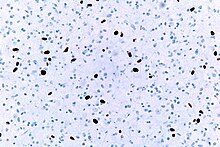Ki-67 (protein)
| Ki-67 (protein) | ||
|---|---|---|

|
||
| according to PDB 1r21 | ||
| Identifier | ||
| Gene name (s) | MKI67 | |
Antigen KI-67 also Ki-67 or MKI67 (Ki - Kiel) is a protein that is suitable for marking dividing human cells . During the interphase , the antigen can be found inside the cell nucleus . At the time of mitosis , a large part of the protein is transferred to the surface of the chromosome. The fact that the protein is present during the active G (1), S, G (2), and M phases of the cell cycle , but is absent in the G (0) phase of resting cells, makes it one good marker to determine the growth fraction of a cell population. An antibody called MIB-1 (Molecular Immunology Borstel) is often used for this purpose. The immunohistochemical display is an important and frequently used examination in routine pathological diagnostics. The growth rate of tumors can be determined with the help of the Ki-67 protein as a marker. The marker is used as standard when diagnosing breast cancer but also other types of cancer.
Individual evidence
- ↑ a b Re-evaluation of histological diagnoses of malignant mesothelioma by immunohistochemistry. Retrieved October 19, 2014 .
- ^ Scholzen T, Gerdes J: The Ki-67 protein: from the known and the unknown . In: J. Cell. Physiol. . 182, No. 3, March 2000, pp. 311-22. doi : 10.1002 / (SICI) 1097-4652 (200003) 182: 3 <311 :: AID-JCP1> 3.0.CO; 2-9 . PMID 10653597 .
- ↑ Tumor biology in breast cancer. Retrieved September 1, 2018 .
